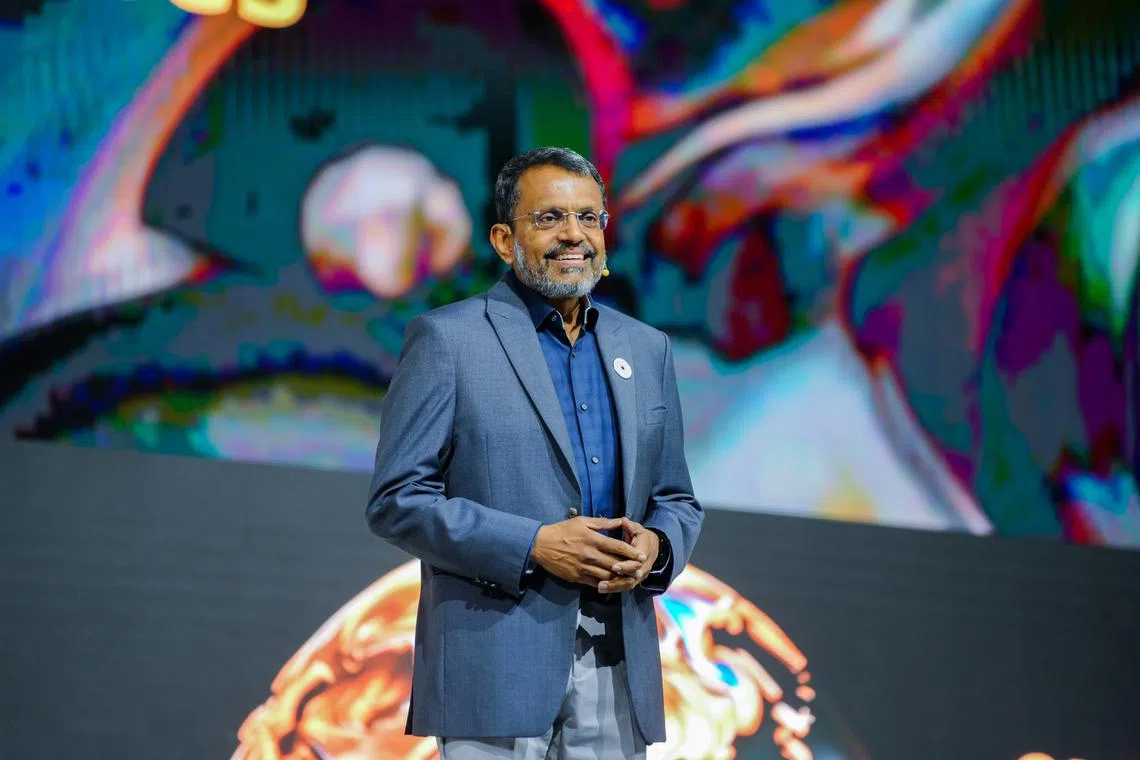AI risks need to be better managed in financial sector: Ravi Menon
Sign up now: Get ST's newsletters delivered to your inbox

Former chief central banker Ravi Menon said that there is a need to minimise unconscious bias, social exclusion and ethically unacceptable outcomes.
PHOTO: GFTN
SINGAPORE – Artificial intelligence (AI) presents huge benefits for the financial sector but risks need to be managed so that its potential can be harnessed safely, said former chief central banker Ravi Menon on Nov 6.
Data privacy is one consideration. There is also a need to minimise the “black box syndrome”, where the massive amount of data, complexity of algorithms and dynamic nature of AI systems make results difficult to interpret and explain, he added.
Accountability is another factor, noted Mr Menon in his keynote address at the Singapore FinTech Festival. “How can we hold humans ultimately responsible for decisions made by self-learning algorithms and machines? You cannot charge a machine for negligence in a court of law. You need to charge a person.”
There is also a need to minimise unconscious bias, social exclusion and ethically unacceptable outcomes.
“AI models trained on incomplete or biased data can generate seemingly plausible but unsound predictions. These can in turn lead to flawed financial decisions regarding credit or investments,” said Mr Menon, chairman of the Global Finance and Technology Network (GFTN), a not-for-profit entity newly formed by the Monetary Authority of Singapore (MAS).
GFTN’s forums will have a growing emphasis on AI and quantum computing. Conferences are one of the network’s four business lines, along with advisory and research services, digital platform services for firms, and an investment fund for technology start-ups.
If quantum technologies take off, the coupling of AI and quantum computing could unlock huge opportunities, as well as unprecedented security challenges, said Mr Menon.
GFTN forums will aim to address the pros and cons of various AI models and strengthen governance frameworks around AI, among other areas.
AI has been deployed in financial services through the likes of deep-learning models that analyse multiple layers of complex data to train sophisticated artificial neural networks.
For example, Ant International uses such models to assess a loan applicant’s credit-worthiness by analysing thousands of data points from its online behaviour and digital footprint.
Large language models – a specific tool within generative AI (gen AI) – can process massive amounts of text data to predict human language patterns and create content. JP Morgan’s large language model can, for instance, review 12,000 commercial credit agreements in seconds, a task which previously consumed 360,000 hours of work each year.
Gen AI can track transactions based on location, device and operating system, flagging any anomaly or behaviour that does not fit expected patterns, noted Mr Menon. Gen AI can also be used to provide personalised financial advice based on customers’ goals, risk profiles, income levels and spending habits.
Climate technology is another area the financial industry is focusing on. Gprnt, MAS’ digital platform for environmental, social and governance reporting and data, released tools on Nov 6 to help businesses with their sustainability reporting and enable them to navigate related solutions.
Mr Menon said Gprnt will focus on piloting the use of these tools with financial institutions, corporates, trade associations and government agencies. Twenty public and private sector organisations in Singapore have already registered their interest.
Meanwhile, GFTN will launch in 2025 its first forum dedicated to fostering innovation and investment in climate tech, and sustainability solutions for the financial sector.
“Addressing climate change has become a priority in the financial sector, with growing interest in financing climate tech solutions for both carbon mitigation and climate resilience,” said Mr Menon, who is also Singapore’s ambassador for climate action.
GFTN will also sharpen the focus of Elevandi’s five existing forums, which include the Singapore FinTech Festival, and expand into new geographies to double its global footprint over the next five years.
The network will replace Elevandi – the company limited by guarantee set up by MAS four years ago to organise the Singapore FinTech Festival. Mr Menon previously described the new entity as “Elevandi on steroids”, with an expanded reach beyond the forums business.
When it comes to funding, the network will catalyse equity investments in early- and growth-stage enterprises with potential to succeed commercially and make a positive social impact, in areas such as financial inclusion and environmental sustainability.
“We will provide these enterprises with patient capital, to give them the time and space to build up the capabilities to succeed,” said Mr Menon on Nov 6.
The network will partner world-class venture funds and asset management firms to tap their investment expertise and infrastructure, he added.
It has also signed memorandums of understanding with two central banks on fintech advisory services. The first is to support the Bank of Namibia’s efforts to build its fintech ecosystem and digital public infrastructure. The network will also help the National Bank of Georgia grow the country’s fintech industry.
Mr Menon also announced the names of GFTN’s board of directors, which includes ProsperCap Corporation chief executive Iqbal Jumabhoy, Sun Life Canada president Jessica Tan and GFTN group CEO-designate Sopnendu Mohanty. They will be guided by an international advisory board, which includes Ant Group chairman and CEO Eric Jing and former UBS chairman and ex-Deutsche Bundesbank president Axel Weber.



